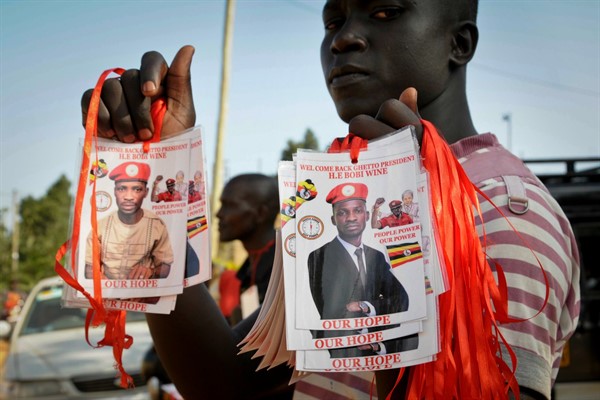KAMPALA, Uganda—When Maria Ledochowska Nnatabi wears a red beret in her village in eastern Uganda, her neighbors whisper warnings. “My daughter, you’re going to be killed,” they tell her. “Please remove that beret—your life comes first.” She keeps it on anyway. As a 25-year-old youth leader in People Power, a political movement that is shaking up Uganda’s stifled politics, she has decided to stop being afraid. “The thing we have to do as a movement is see how can we get fear out of these people,” she says.
Red emerged as the color of political resistance in Uganda in 2017, when parliament introduced a measure to scrap a clause in the constitution requiring presidential candidates to be under the age of 75. The amendment aimed to allow the president, Yoweri Museveni, then 73, to run for office again in 2021. Protests spread across the country, under the rallying cry of “Togikwatako!” or “Don’t touch it!” in Luganda—“it” being the constitution. Opposition lawmakers wore red ribbons of protest to parliament, where they sang the national anthem to prevent the motion from being considered. The next day, they were dragged out of the chamber by soldiers from an elite presidential guard. As soon as they were gone, Museveni’s supporters in parliament rushed to pass the motion, and a subsequent amendment bill, which was enacted in early 2018.
One of the defiant parliamentarians was a 35-year-old singer named Robert Kyagulanyi, better known to Ugandans as Bobi Wine, who had won his seat in a by-election just a few months before. I met him after that first night of protests at his recording studio in Kamwokya, a poor neighborhood in the capital, Kampala. He paced the floor in his socks, red tie still looped around his forehead, and talked about injustice: police violence, hospitals without medicines, institutions gutted by corruption. “This is a national cause, this is a generational cause,” he told me, rocking up on his toes. “What we want is to take power back to the people.”

